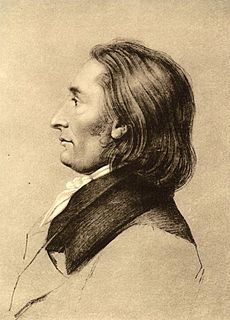A Quote by Johann Peter Eckermann
Wearing spectacles makes men conceited, because spectacles raise them to a degree of sensual perfection which is far above the power of their own nature.
Related Quotes
Kant, discussing the various modes of perception by which the human mind apprehends nature, concluded that it is specially prone to see nature through mathematical spectacles. Just as a man wearing blue spectacles would see only a blue world, so Kant thought that, with our mental bias, we tend to see only a mathematical world.
So the journey is over and I am back again where I started, richer by much experience and poorer by many unexploded certainties. For convictions and certainties are too often the concomitants of ignorance. Those who like to feel they are always right and who attached a high importance to their own opinions should stay at home. When one is traveling, convictions are mislaid as easily as spectacles; but unlike spectacles, they are not easily replaced.
So you actually need spectacles,” Leo finally said. “Of course I do,” Marks said crossly. “Why would I wear spectacles if I didn’t need them?” “I thought they might be part of your disguise.” “My disguise?” “Yes, Marks, disguise. A noun describing a means of concealing someone’s identity. Often used by clowns and spies. And now apparently governesses. Good God, can anything be ordinary for my family?
Communism is an aspiration, an aspiration is an ideal, a dream, a longing of something that would be perfect, but hard to build because it has to clash with human nature and against the egotism of humans and the egotism of the elites which usually try to guarantee their own interests above those of their nations and of their own people. But they are the ones that prevail because they have the economic power, the political power and the military power.
As it is with spiritual discoveries and affections given at first conversion, so it is in all subsequent illuminations and affections of that kind; they are all transforming. There is a like divine power and energy in them as in the first discoveries; they still reach the bottom of the heart, and affect and alter the very nature of the soul, in proportion to the degree in which they are given. And a transformation of nature is continued and carried on by them to the end of life, until it is brought to perfection in glory.
Observe that noses were made to wear spectacles; and so we have spectacles. Legs were visibly instituted to be breeched, and we have breeches. Stones were formed to be quarried and to build castles; and My Lord has a very noble castle; the greatest Baron in the province should have the best house; and as pigs were made to be eaten, we eat pork all year round; consequently, those who have asserted all is well talk nonsense; they ought to have said that all is for the best.
Books, as Dryden has aptly termed them, are spectacles to read nature. Aeschylus and Aristotle, Shakespeare and Bacon, are priests who preach and expound the mysteries of man and the universe. They teach us to understand and feel what we see, to decipher and syllable the hieroglyphics of the senses.
To the scientist, nature is always and merely a 'phenomenon,' not in the sense of being defective in reality, but in the sense of being a spectacle presented to his intelligent observation; whereas the events of history are never mere phenomena, never mere spectacles for contemplation, but things which the historian looks, not at, but through, to discern the thought within them.

































